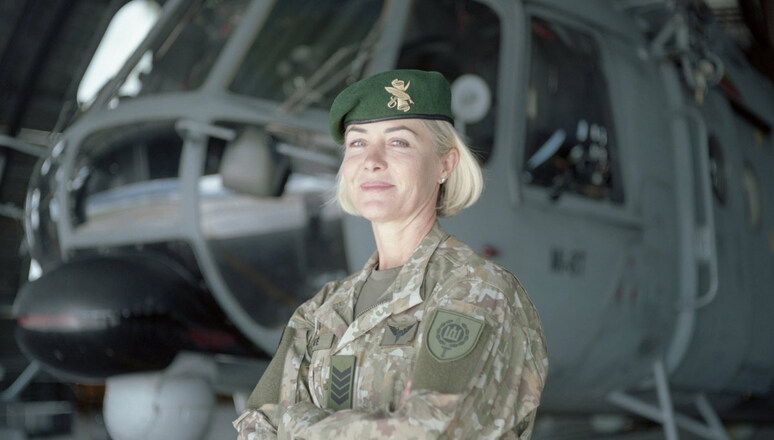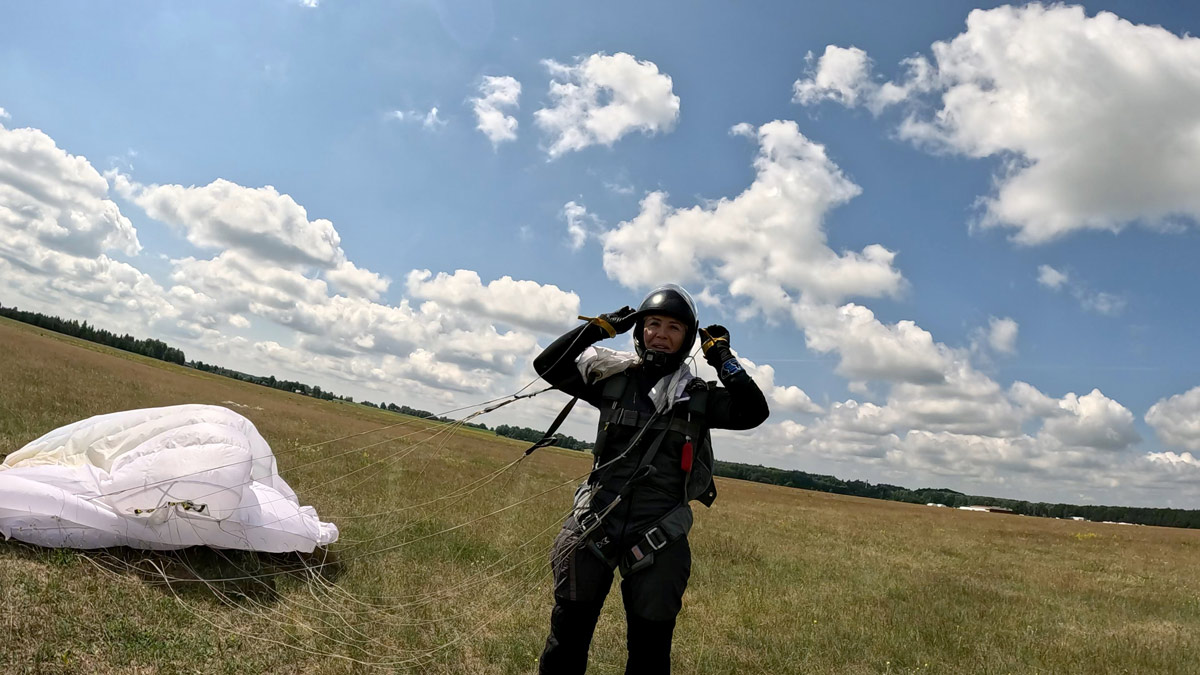Re: Brigada de Infantaria Paraquedista
Enviado: Sex Ago 02, 2024 7:54 am
Meet Master Sergeant Violeta Nikonovė, who has jumped from a plane more than 5,000 times
In 1985, at the age of 15, Violeta Nikonovė jumped out of a plane for the first time. Seven years later, she was recruited to join the paratrooper branch of the Lithuanian Armed Forces. Now, almost 40 years and over 5,000 jumps later, Master Sergeant Nikonovė serves as a senior instructor at the Lithuanian Armed Forces’ Parachute Training Centre. We caught up with Violeta to ask about her experience as a “Parachute Master” and what it means to her to train the next generation of paratroopers.

All photos © Master Sergeant Violeta Nikonovė
Skydiving was initially a hobby for Violeta – one that she literally threw herself into with enthusiasm. By the time she was asked to join the Aerial Parachute Unit of the Lithuanian Armed Forces’ Field Army Brigade in 1992, she had already completed an impressive 1,000 jumps, averaging no less than 142 jumps a year. Thanks to her already vast experience, she was awarded the honorary title of “Parachute Master” shortly after joining the armed forces. Violeta had managed to turn the passion she discovered when she was just 15 years old into her career.
Having joined the Lithuanian Armed Forces just a couple of years after the restoration of Lithuania’s independence in 1990, Master Sergeant Nikonovė has been part of her country’s historic journey to becoming a NATO Ally in 2004. In her career, this has meant modernising Lithuania’s parachute regiments to meet NATO standards and contributing to the development of Lithuania’s Parachute Training Centre.
The Centre, where Violeta currently serves, has evolved beyond training solely the Lithuanian Armed Forces – it now also trains troops from NATO partner countries, including Armenia, Georgia, Kazakhstan, the Republic of Moldova and Ukraine. Through her tireless dedication, Violeta has been instrumental in teaching and mentoring generations of Lithuanians and partner troops alike.
What made you want to become a parachutist? When did you start and what was your first jump like?
My brother was a hobby parachutist and he invited me to join a parachute club he was part of when I was 15. I spent three months learning about the theory and other aspects of parachuting and in the spring of that year, we went for the first jump. I remember it very well. As the plane took off, my legs were shaking and eventually my brother signalled it was time to jump. The sensation of jumping was very exhilarating, but it was difficult because the wind that day was quite strong and physically I was very light, so I was blown a bit off course and ended up landing in a farm.
Did you know after your first jump that you wanted to go again?
Absolutely. Despite my fears when the plane took off, I immediately wanted to do it again. When I did my first jump, on that day, I only completed a single jump; however, my second jump was the very next day. This one was actually scarier, but my brother and other members of the parachutist club encouraged me to go. During my landing for my second jump, I had a very difficult time disconnecting from the parachute and I was dragged across the ground for a long time before my brother was able to come and help me.
Since that second jump you have clearly come a long way – what kind of physical exercises do you need to do to be a parachutist? What kinds of strengths do you find most important?
Parachuting requires general physical training. To become a good skydiver, you need a strong back, shoulders, arms and legs to be able to make more than one jump a day.
Can you explain what a “forced deployment” parachute jump means? How is it different from “freefall” jumping?
Forced deployment means a parachutist performs jumps with a round parachute that deploys automatically at a pre-determined altitude. This reduces the risk of human error and makes the jump safer for troops. If parachutists wish to continue developing their skills, they can aim for the Freefall course at our Training Centre, and learn how to deploy their parachutes manually. Every year, we train about 200 forced parachutists and 20 freefall parachutists and, as such, it is hard to count how many we have trained over the last 30 years!
With over 5,000 jumps to your record, has a jump ever gone wrong?
Yes, some jumps do not go as planned. There have been three jumps where I had to use the reserve parachute because the main parachute deployed poorly and was not fit for landing. Otherwise, I had two particularly rough landings, which led to two screws in my knee joint.
What was the feeling when you had to use the reserve parachute for the first time? When you had one of these bad jumps or rough landings, did you want to stop for a while?
The first time I used the reserve parachute, I had already done 800 jumps. On that jump, I had to unhook a badly deployed main parachute and deploy the reserve. I did everything automatically, but when I used the reserve parachute, it was of course a little uncomfortable. I was very careful how I operated the parachute because there is no other reserve parachute. Still, I made two more jumps that day. The discomfort disappeared when I realised after the analysis that I had done everything well and correctly, so it was ultimately a good experience.
It seems like you have to be fearless to be a parachutist… but do you have any phobias or fears?
I have always been afraid of blood. I used to faint whenever I saw it. However, being in the Lithuanian Armed Forces, I have actually had the chance to participate in and graduate from the army paramedic course, so I am fully qualified as an Army Paramedic in addition to my Chief Instructor duties. After this course and the training needed to become a paramedic, blood does not bother me! Similarly, although I have never been afraid of skydiving from a plane, I was scared of diving underwater. But through my experience in the army, I have also completed several swimming courses and dove three times with our army combat divers. I think any of our phobias exist in our minds and can ultimately be overcome step by step.
You have completed 5,000 jumps. How many jumps does this mean in a year? How did you reach this huge number?
There are actually skydiving competitions and I was part of the Lithuanian national team, participating in world championships and the like. During this time, I was jumping more than usual, completing around 200 to 300 jumps per year.
How long were you part of the Lithuanian national team? Are there any competitions you won individually or as a team?
I was on the Lithuanian national team for over 20 years. I was the Lithuanian champion many times in the women's event, and I also participated in the men's event, because I was the only one of the women who was jumping professionally as part of my military career. I also did a lot of jumps with the team, and we were champions many times. I’ve lost count!
How does a parachutist celebrate the 5,000th jump?
Every 1,000 jumps are usually celebrated in some way or another. Typically, the 1,000th jump is a clutch in freefall, which is where a group of divers join up mid-air, clutching hands and legs together.
For my 5,000th jump, I was on the job and training a soldier. After this jump, my colleagues and I celebrated at a sauna and had a feast. It was a very nice celebration!
The Lithuanian Parachute Training Centre teaches parachutists from NATO partner countries. Do you also cooperate with troops from other NATO Allies?
I participate in training sessions with NATO troops for parachute jumps, and assist if they need our help. We also participate in international symposia where we can learn about innovations and share experiences and problems. We also cooperate with civilian parachutists.
What is the most rewarding part of your job?
I love being able to share my passion and experience with others. I have been very fortunate to develop my parachute skills and it has allowed me to share my knowledge with parachutists who have made fewer jumps than me, as well as to learn from those who have jumped even more than me. It is very rewarding to see how people develop through parachuting and it’s fun to see beginners improve, learn how to act in extreme situations and become physically as well as mentally stronger. For me and for many students it has been a gift, not only in our professional military careers but also in our lives as a whole.
Recently, the Parachute Training Centre has added two new instructors: former students, whom we trained from their very first jump. For me, watching their evolution from first jump to instructor has made me very proud to be part of the Lithuanian Armed Forces and has been very rewarding personally and professionally.



